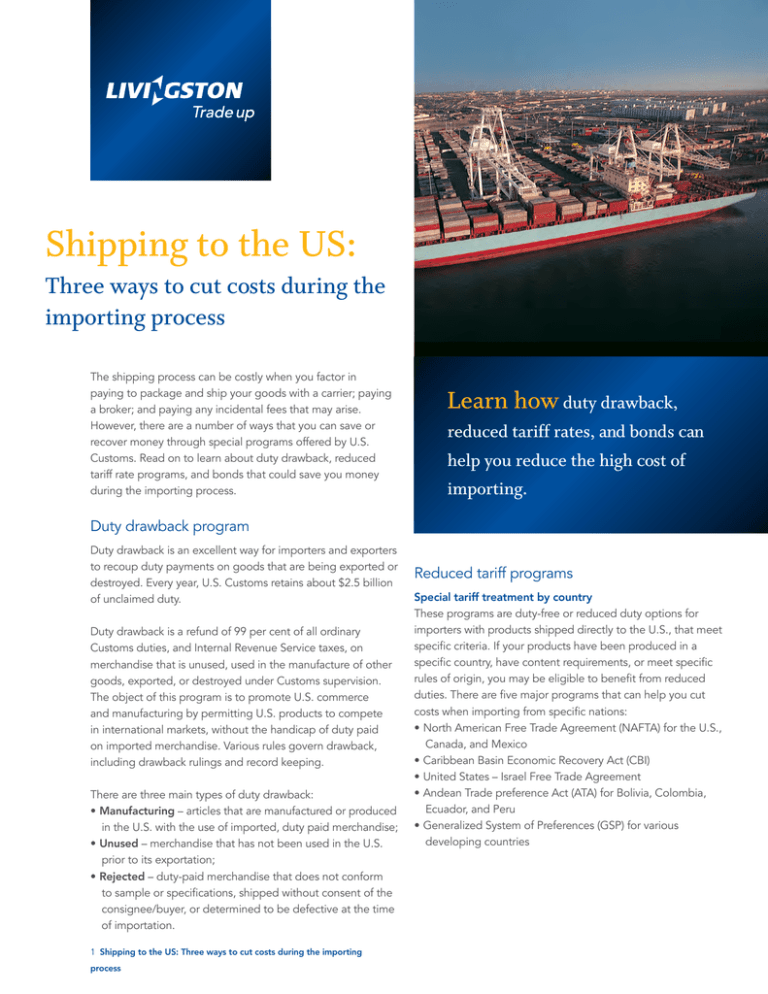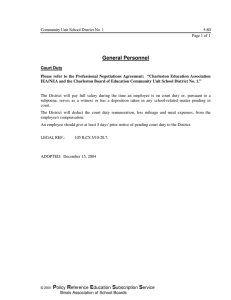Shipping to the US: Learn how
advertisement

Shipping to the US: Three ways to cut costs during the importing process The shipping process can be costly when you factor in paying to package and ship your goods with a carrier; paying a broker; and paying any incidental fees that may arise. However, there are a number of ways that you can save or recover money through special programs offered by U.S. Customs. Read on to learn about duty drawback, reduced tariff rate programs, and bonds that could save you money during the importing process. Learn how duty drawback, reduced tariff rates, and bonds can help you reduce the high cost of importing. Duty drawback program Duty drawback is an excellent way for importers and exporters to recoup duty payments on goods that are being exported or destroyed. Every year, U.S. Customs retains about $2.5 billion of unclaimed duty. Duty drawback is a refund of 99 per cent of all ordinary Customs duties, and Internal Revenue Service taxes, on merchandise that is unused, used in the manufacture of other goods, exported, or destroyed under Customs supervision. The object of this program is to promote U.S. commerce and manufacturing by permitting U.S. products to compete in international markets, without the handicap of duty paid on imported merchandise. Various rules govern drawback, including drawback rulings and record keeping. There are three main types of duty drawback: •Manufacturing – articles that are manufactured or produced in the U.S. with the use of imported, duty paid merchandise; •Unused – merchandise that has not been used in the U.S. prior to its exportation; •Rejected – duty-paid merchandise that does not conform to sample or specifications, shipped without consent of the consignee/buyer, or determined to be defective at the time of importation. 1 Shipping to the US: Three ways to cut costs during the importing process Reduced tariff programs Special tariff treatment by country These programs are duty-free or reduced duty options for importers with products shipped directly to the U.S., that meet specific criteria. If your products have been produced in a specific country, have content requirements, or meet specific rules of origin, you may be eligible to benefit from reduced duties. There are five major programs that can help you cut costs when importing from specific nations: •North American Free Trade Agreement (NAFTA) for the U.S., Canada, and Mexico •Caribbean Basin Economic Recovery Act (CBI) •United States – Israel Free Trade Agreement •Andean Trade preference Act (ATA) for Bolivia, Colombia, Ecuador, and Peru •Generalized System of Preferences (GSP) for various developing countries Most Favored Nation (MFN) rates of duty MFN rates are general rates of duty that are applicable to all products from most countries. Because of a number of recent international trade agreements, these rates have been significantly reduced over the past years. Column 2 rates: Column 2 rates are duty rates applied to specific countries that are significantly higher than most others. Products from the following countries, whether imported directly or indirectly, are included: •Afghanistan •Laos •Cuba •North Korea U.S. goods returned U.S. goods returned are goods that are accorded duty relief in some form based on their use, value, and components: •U.S. goods returned without having been advanced while abroad and originally exported from the U.S. without drawback will usually re-enter the U.S. duty free; •The value of U.S. fabricated components, if exported and assembled abroad, can normally be deducted from the full dutiable value of the imported articles; •Articles exported from the U.S. for repairs, alterations. The penalty for failure to meet the bond conditions is normally two times the normal duty. Temporary Importation Bonds (TIBs) TIBs are bonds that allow imported goods to be admitted without the payment of duty under certain conditions: •The goods are not to be sold in the U.S.; •The imported merchandise is to be exported or destroyed. The one-year bond period may be extended, not to exceed a total of three years, and destruction is permitted in lieu of exportation; •The goods are to be repaired, altered, or processed; are models for testing; are samples to be returned; etc. The penalty for failure to meet the bond conditions is normally two times the normal duty. Contact your Livingston account executive e-mail us at solutions@livingstonintl.com or give us a call at 1-800-837-1063 Visit www.livingstonintl.com 2 Shipping to the US: Three ways to cut costs during the importing process






